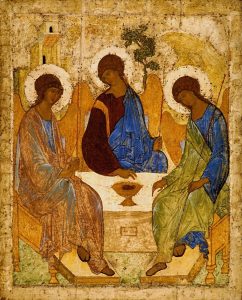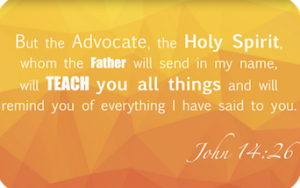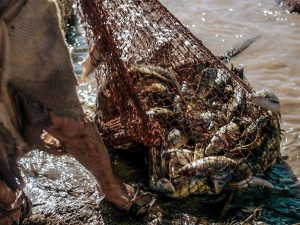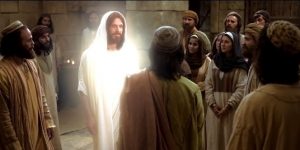Some people ask themselves questions about God.
In fact, many people would want to know more about him –
know more, more clearly, more deeply.
But could it be that they miss some important revelation about him?
Revelation: showing clearly, removing what is covering something, making known.
Yes, God has been revealed to us but… he remains GOD –
we will never have achieved knowing him fully…
In the 2nd reading of today’s feast – that of the Holy Trinity – 
writing to the first Christians of Rome (Rom.5:1-5), saint Paul tells them:
“Through Jesus we have entered this state of grace…
The love of God (the Father) has been poured into our hearts
by the holy Spirit which has been given to us.”
It is as if Paul, in a nutshell, is giving us – as well as the Roman Christians of long ago –
the meaning of today’s feast.
We are “In a state of grace”, in other words: we are blessed, we are privileged, ‘graced’ by God.
Thanks to Jesus who made it known to us, we can be assured that God is our Father –
a Father who loves us more than we will ever understand.
This certainty is given to us by the Holy Spirit, the Spirit of God himself.
Some theological texts will speak of ‘the mystery of the Holy Trinity’.
Sad to say, some people conclude: a mystery is something we cannot understand
so we cannot understand the Holy Trinity!
A more accurate definition of a mystery is that it is something we have never finished understanding…
And what if… this ‘mysterious’ REALITY were the meaning of our daily life?
Yes, even in its seemingly most insignificant details!…
Note: Another reflection is available on a similar theme in French at: https://image-i-nations.com/fete-de-la-sainte-trinite-annee-c-2019/
Source: Image: etsy.com






 Nowadays, technology has changed things, of course.
Nowadays, technology has changed things, of course.

 Jn.21:1-19), there is an interesting detail that illustrates this.
Jn.21:1-19), there is an interesting detail that illustrates this.